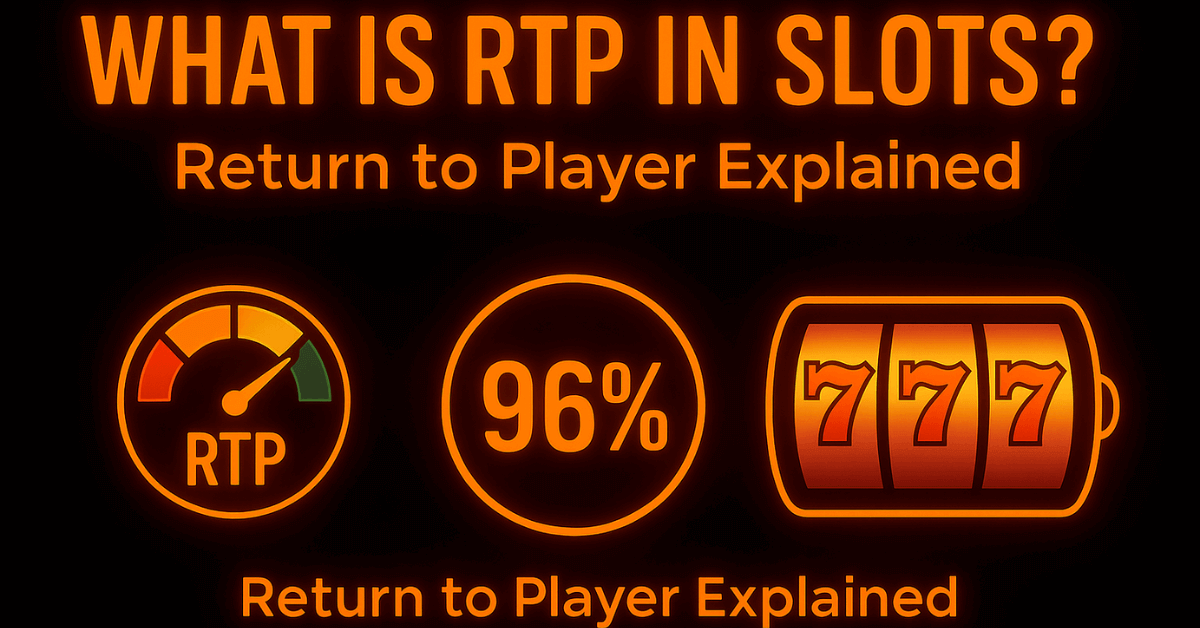
RTP in Slots Introduction
If you’ve ever checked a slot game’s info panel, you’ve likely come across a percentage called RTP. But what does it really mean? And how does it impact your chances of winning? In this guide, we’ll break down Return to Player (RTP) in a clear, beginner-friendly way — so you can make smarter decisions next time you spin.
What Does RTP in Slots Mean?
RTP stands for Return to Player. It’s a percentage that tells you how much of all wagers a slot is expected to pay back to players over the long term. For example:
- A game with 96% RTP will return €96 for every €100 wagered — on average over thousands of spins.
This number doesn’t reflect your individual outcome but gives a long-term statistical average.
Why RTP Matters
While RTP doesn’t guarantee wins, it does provide a sense of how favorable the odds are. A slot with 98% RTP has a theoretical house edge of 2%, compared to one with 92% RTP and an 8% edge.
In the long run, higher RTP games are generally better for your bankroll. However, volatility (or variance) also plays a key role.
How Is RTP Calculated?
Slot developers simulate millions or billions of spins to measure how much a game returns. For example, if players bet €1 billion and win back €960 million, the RTP is 96%.
It’s important to note:
- RTP is fixed: The outcome is controlled by RNG (Random Number Generator), not by recent results.
- Regulated games: Licensed jurisdictions require transparency and fair RNGs.
RTP vs Volatility: What’s the Difference?
RTP is how much a game returns over time, while volatility describes how often and how big the wins are.
| RTP | Volatility |
| Long-term average return | Risk level (low, medium, high) |
| Doesn’t predict win size | Affects hit frequency and payout size |
Example:
- A 96% RTP high-volatility slot might pay rarely but with big wins.
- A 94% RTP low-volatility slot pays more often, but smaller amounts.
Examples of High-RTP in Slots
If you’re looking to maximize value, here are some popular high-RTP games:
- Blood Suckers (NetEnt) – 98%
- Mega Joker (NetEnt) – up to 99%
- Ugga Bugga (Playtech) – 99.07%
- Book of 99 (Relax Gaming) – 99%
Many modern games (especially from Play’n GO, Pragmatic Play, and NetEnt) fall around 94% to 96%.
RTP Settings: Fixed vs Variable
Some providers allow casinos to choose from different RTP settings (e.g., 92%, 94%, or 96%). That means the same game may have different RTP versions, depending on the operator.
Before playing, always check the info panel or paytable to see the exact RTP.
Should You Only Play High-RTP Slots?
Not necessarily. While a higher RTP gives better long-term value, it’s just one factor. You should also consider:
- Volatility: Does the game match your risk tolerance?
- Theme & gameplay: Is it fun to play?
- Bonus features: Do you enjoy the mechanics?
If you’re playing casually for entertainment, pick a game that suits your style. But if you want to stretch your bankroll, high-RTP slots are a smart choice.
RTP Myths Debunked
- “The game hasn’t paid in a while, it’s due!” → False. Every spin is random.
- “If I play max bet, RTP increases.” → False. Most games have fixed RTP regardless of bet size.
- “New games always pay more at launch.” → Not necessarily. Launch timing doesn’t affect RTP.
Final Tips Before You Spin
- Look for games with 96%+ RTP
- Check if the version has adjustable RTP (ask support or read info panel)
- Test in demo mode first
- Play responsibly and set limits
FAQs – RTP in Slots
What is considered a good RTP in slots?
Anything over 96% is considered above average.
Can RTP be manipulated?
Not in licensed casinos. Regulated games are audited and RNG-certified.
Why do some slots hide the RTP?
Some operators or versions may not display it clearly. Always check the paytable or provider’s official site.
Do bonus features affect RTP?
Yes, some bonus buy features or jackpots may slightly lower RTP.
Conclusion
RTP isn’t a guarantee, but it’s a key tool for smarter gambling. Pair it with an understanding of volatility, game features, and responsible habits — and you’ll be a better-informed player.
Want to learn more? Read our guides on Volatility in Slots, Responsible Gambling, and Slot Tools & Trackers to improve your edge while keeping it fun.